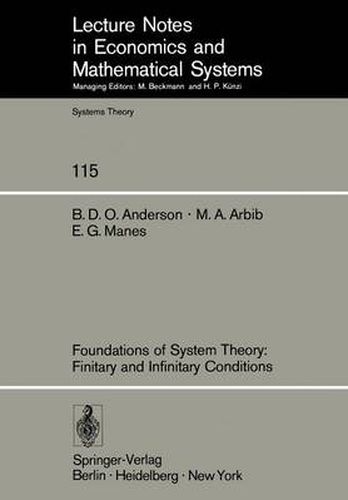Readings Newsletter
Become a Readings Member to make your shopping experience even easier.
Sign in or sign up for free!
You’re not far away from qualifying for FREE standard shipping within Australia
You’ve qualified for FREE standard shipping within Australia
The cart is loading…






This title is printed to order. This book may have been self-published. If so, we cannot guarantee the quality of the content. In the main most books will have gone through the editing process however some may not. We therefore suggest that you be aware of this before ordering this book. If in doubt check either the author or publisher’s details as we are unable to accept any returns unless they are faulty. Please contact us if you have any questions.
This paper is one of a series in which the ideas of category theory are applied to problems of system theory. As with the three principal earlier papers, [1-3], the emphasis is on study of the realization problem, or the problem of associating with an input-output description of a system an internal description with something analogous to a state-space. In this paper, several sorts of machines will be discussed, which arrange themselves in the following hierarchy: Input process Machine Output process (Tree automaton) Machine ~ ~ State-behavior Machine I Adjoint Machine .(Sequential Machine) ., I Decomposable Machine (Linear System, Group Machine) Each member of the hierarchy includes members below it; examples are included in parentheaes, and each example is at its lowest possible point in the hierarchy. There are contrived examples of output process machines and IV state-behavior machines which are not adjoint machines [3], but as yet, no examples with the accepted stature of linear systems [4], group machines [5, 6], sequential machines [7, Ch. 2], and tree automata [7, Ch. 4].
$9.00 standard shipping within Australia
FREE standard shipping within Australia for orders over $100.00
Express & International shipping calculated at checkout
This title is printed to order. This book may have been self-published. If so, we cannot guarantee the quality of the content. In the main most books will have gone through the editing process however some may not. We therefore suggest that you be aware of this before ordering this book. If in doubt check either the author or publisher’s details as we are unable to accept any returns unless they are faulty. Please contact us if you have any questions.
This paper is one of a series in which the ideas of category theory are applied to problems of system theory. As with the three principal earlier papers, [1-3], the emphasis is on study of the realization problem, or the problem of associating with an input-output description of a system an internal description with something analogous to a state-space. In this paper, several sorts of machines will be discussed, which arrange themselves in the following hierarchy: Input process Machine Output process (Tree automaton) Machine ~ ~ State-behavior Machine I Adjoint Machine .(Sequential Machine) ., I Decomposable Machine (Linear System, Group Machine) Each member of the hierarchy includes members below it; examples are included in parentheaes, and each example is at its lowest possible point in the hierarchy. There are contrived examples of output process machines and IV state-behavior machines which are not adjoint machines [3], but as yet, no examples with the accepted stature of linear systems [4], group machines [5, 6], sequential machines [7, Ch. 2], and tree automata [7, Ch. 4].